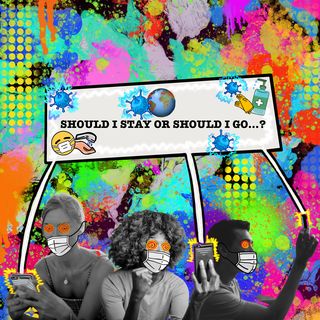By Nicklas Balboa & Richard D. Glaser, PhD
Published in: Psychology Today
Recent developments shine a light on the powers of mass media and groupthink.
The global attention given to COVID-19 has led to stock-outs and shortages on surgical masks, respirators, hand sanitizer, delayed countless unrelated blog posts, and birthed an unusual association with a choice beer1. Is this the kind of hysteria that punk-rock, Hall of Fame, band Greenday foresaw in their 6x Platinum record American Idiot?
A virus that's reached pandemic2 levels is no joke, and its rapid advance into our society has sent ripples of fear and panic across the globe, affecting the economy and various industries including governments, healthcare, travel, entertainment, education, and manufacturing. Big money aside, this virulent bug has altered our lives, shutting down many day-to-day operations (from universities, to companies, to entire countries) and converting the proverbial 9-5'er into a new army of virtual workers.
Which begs the question: In a time where access to information is just a click away, how did we overlook the potential, and now realized, dangers of this strain of coronavirus?
While quick access to information is convenient and very useful, it also creates a litany of issues surrounding confirmation-bias, groupthink, and the spread of misinformation. Just a few weeks ago our leaders gave us the gentle affirmation that "Everything is OK, and that this virus will be contained." Countless clips surfaced on the over-estimation of the virus and its potential to spread, suggesting that our daily lives will go on as usual. Today, with the thought of Italy going from 10 to over 10,000 cases, it seems that down-playing the virus' power to spread hampered viable containment options3.
However, that won't stop the power of groupthink from affecting how we deal with issues of a global scale. Time constraints, a threatening virus, failure to contain it, and the difficulty behind the decision-making process are all factors that contribute to polarized opinions. In the face of danger, the subsequent slew of mixed messages left many travelers; theater-goers; those who dine out, as examples wondering: "Should I stay or should I go?"
The real danger lies in the fact that the important information, wise words from experts in health and disease control epidemiologists, gets drowned out amid the echoes of those attempting to quell, or stir, any panic among the masses.
According to Dr. Ashish Jha, Director, Harvard Global Health Institute, delays in testing from the US are the cause of the mass state side shut-downs4. Without a test model to immediately roll out, identify, and quarantine those who test positive for the virus, shutting down major facilities and promoting social distancing emerged as the only viable options for containment, although the seemingly exponential increase in reported cases might leave experts still shaking their heads.
However, Dr. Michael Ryan, Executive Director, WHO Health Emergencies Program, believes that an organized government-led response can contain the disease's spread, as shown in Hong Kong and Singapore4. How can we ensure that our diplomats overcome any hurdles in the pursuit of international co-operation?
Conversational Intelligence® is a methodology that can facilitate conversations between governments by generating awareness and providing both a framework and platform for people to connect, navigate, and work together. By joining forces through transparent communications, leaders can provide our health experts with the necessary data to gain a greater understanding of COVID-19, its spread, and generate a set of best practices for prevention, identification, treatment, and hopefully a vaccine.
Right now the greatest risk to our health is complacency. Let's give this threat the proper attention its due and remember what the experts are saying: wash your hands, avoid touching your face, maintain distance from anyone who could be sick, and finally, if you choose to seek medical attention, call in advance5. For now, we await the next headline.
References









